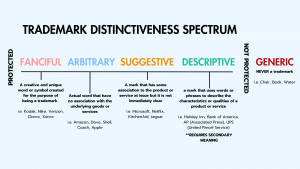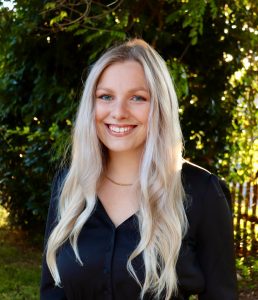The rise of social media has presented challenges to trademark law, as it has blurred the lines between creative expression and brand identity used in commerce. Social media platforms like TikTok have fundamentally changed how entertainment is produced, consumed, and monetized. Social media provides an entertainment platform that allows for entertainment from user to user instead of from an entertainment company to a viewer. TikTok is particularly known for its popular trends and quick fame achieved through its short-form content. Many creators on this platform become known through catchphrases, witty one-liners, and nicknames. These phrases have potential to generate significant value through increased followings, brand deals, merchandise, and online advertising. This raises the question of whether a TikTok catchphrase or nickname can be a valid trademark. If so, does the creator who popularized it through the app have rights to the mark?
“Very Demure, Very Mindful”
One TikTok creator, Jools Lebron, recently experienced social media success through her catchphrase, “very demure, very mindful, very cutesy.” Along with her increase in fame and popularity, came success in the influencer market including valuable collaborations with other brands and companies that wanted to use the viral catchphrase.
Lebron’s social media success raises questions about intellectual property rights on TikTok. Although she is credited with the success of the “very demure” catchphrase, two individuals, who are not Lebron, filed trademark registration applications for the phrase. These applications (Very Demure, Very Mindful, Very Demure… Very Mindful …, and Very Demure Very Cutesy) have the potential to complicate Lebron’s continued use of her catchphrase because the applications are for the same classes of goods/services. The Very Demure… Very Mindful… and Very Demure Very Cutesey applications seek registration for use on advertising and marketing services. Lebron currently uses her “very demure” phrase in her influencer marketing servies. The Very Demure, Very Mindful application seek registration for use on retail store services such as clothing. Lebron currently sells merchandise with her “very demure” catchphrase. Considering the market for influencer merchandise, the application for use on clothing could present issues for her future use in that class of goods
Although registration is not required to have a valid trademark, it gives the trademark owner several advantages, which will be discussed later.
To further understand the situation surrounding the “very demure, very mindful” situation, it is important to understand what constitutes a valid trademark.
What is a Trademark?
A trademark can be a word, symbol, or design that identifies and distinguishes the source of goods or services. This can include phrases, such as Disney’s “May the Force Be With You” and “Hakuna Matata.” These trademarked phrases, made popular by the Star Wars and Lion King movies respectively, serve to identify Disney as the source of the films. It is important to note, however, that source identification is not the only requirement for a valid trademark.
To qualify as a trademark, a mark must be both distinctive and used in interstate commerce on a good or service.
Why does it matter if a slogan is eligible for trademark protection? Owners of a valid trademark have “exclusive” rights to their marks. These rights allow them to:
- Protect Their Brand from Confusion: Trademark owners can prevent others from using their mark (or a confusingly similar mark) in a way that could mislead consumers about the source of goods or services, or even whether goods or services are affiliated.
- Prevent Unfair Profiting: Others cannot use the mark to profit off the goodwill and reputation the trademark owner has built.
- Prevent Brand Harm: Trademark owners can stop others from using their mark in a way that could damage their brand’s image.
It is important to remember that trademark rights are specific to a class or goods or services. This means that the owner can prevent others from using the same or a similar mark in connection with the same goods or services only if it results in confusion as to source or affiliation of goods. This also means that different people can use the same mark for completely different products or services, as long as it doesn’t cause customer confusion as to sponsorship or affiliation with the owner’s mark. Consider the trademarks of Dove Chocolate and Dove Soap. These brands can coexist due to different nature of their goods.
Although use is the foundation of obtaining a trademark, federal registration is still important. Registration isn’t required for a trademark to exist, but it offers significant advantages to the owner of the mark. Such advantages include a presumption of validity (a registered mark is presumed valid in a legal dispute) and constructive notice (registration puts the public, including competitors on notice that you own the mark).
Although you can file a trademark application before you start using the mark through an “intent-to-use application,” the mark won’t be registered until it is actually used in commerce. Importantly, a trademark exists for the first person or company to use the mark in commerce, even if there is no registration.
This is good news for Jools Lebron! The applications filed for her catchphrase were intent-to-use applications. This means that at the time they were filed, they had not used the marks in commerce yet. If Lebron can prove she was the first to use the catchphrase in commerce, she likely has a strong claim to ownership, even though other applications were filed first – assuming, of course, that the catchphrase is a valid trademark.
Validity: Is the “Very Demure” Catchphrase “Very” Distinctive
The first requirement for a valid trademark is that it must be distinctive. In other words, it must act as a source identifier for a good or service.
Distinctiveness is always considered with regard to the specific goods and services. Word marks (which includes catchprases) fall within a spectrum (see image below). This spectrum is comprised of four “levels” of distinctiveness: fanciful, arbitrary, suggestive, and descriptive. The strongest trademarks are fanciful, invented words, or arbitrary, actual words with no association to the good or service. Suggestive trademarks follow and suggest some nature of the good or service without directly describing it. Descriptive trademarks are weaker than suggestive since they describe the good or service. Words that are generic for a good or service are not distinctive and cannot be a trademark.

Graphic Made by Emma Welch.
Lebron’s content is a service for online entertainment and influencer marketing, where she uses her personality and catchphrases to build her brand. She creates lifestyle content, provides fashion and makeup advice, and engages with her followers in various topics through comedy and storytelling. For example, in the video that popularized her “very demure” catchphrase, Lebron provides fashion and makeup advice for work and entertainment. She says “See how I do my makeup for work, very demure, very mindful… I don’t do too much, I am very mindful while I’m at work. See how I look very presentable? The way I came to the interview is the way I go to the job… Very mindful, very modest” She further emphasizes that not looking professional at work is “not demure.”
In Lebron’s case, “very demure, very mindful” is not descriptive of the entertainment services she provides. Although one could arguably describe her entertainment and advice as “very demure and very mindful,” her use of the catchphrase describes the advice or insight she provides, not her service. If her profile page said “Very demure, very mindful advice and entertainment” or her introduction slogan was “Welcome to very demure, very mindful content”, it may constitute descriptive use.
The catchphrase is also not suggestive or fanciful. In regards to suggestiveness, the catchphrase is not suggesting the nature of her content. The catchphrase is used to discuss other content within her videos. The mark is not fanciful because the words are not created or made up words.
The catchphrase could, however, be considered an arbitrary mark.The catchphrase contains real words which have independent meaning. However, the phrase is used in a way that is not connected to the meaning or nature of her services. Similar to why the catchphrase is not descriptive, the use of the words does not generically define her entertainment and consulting/influencing services. Therefore, as a potentially arbitrary mark, Lebron’s viral catchphrase is likely to be considered inherently distinctive and thus likely satisfies the first requirement.
Is Use on TikTok Use in Commerce?
Remember: in order to be valid, a distinctive mark must also be used in commerce on a good or service.
Establishing use in commerce on goods may seem liks a simpler analysis than services because it entails tangible products, like t-shirts or stickers. Influencer merchandise is relatively common in the TikTok space. For example, TikTok creators Campbell “Pookie” and Jett Puckett gained fame on the social media platform through videos of their life in which Jett famously calls Campbell “Pookie.” The use of “Pookie” became an identifier for the couple, which is essential for a trademark. The couple began to sell the mark on clothing such as sweatshirts and hats which they sold to their many fans. The Pucketts filed for registration of “Pookie” as trademark on such goods in August 2024 with the United States Patent and Trademark Office (“USPTO”).
Now, what about Lebron? Can she have a service that is used in commerce?
Marks for services can also be used in commerce, including services used on the internet. For example, TikTok itself as well as ebay are services in commerce. Although the expression of the services differs from traditional means (i.e. direct payment for cable or streaming services, payment for consulting services), it still constitute commerce through services. The nature of the user-user entertainment and the fact that Lebron doesn’t directly charge for her entertainment services doesn’t disqualify use of the catchphrase from being classified as a use in commerce. Her service constitutes entertainment and influencer marketing. Influencer marketing is a service companies purchase that capitalizes on an influencer’s brand identity to increase their own brand awareness. For example, Lebron’s popular catchphrase has helped her establish deals with Lyft (“very demure, very lyftsey”) and Verizon.
Although not required, Lebron currently has a pending USTPO application for the catchphrase. As long as she can prove that the catchphrase is connected her services on TikTok, she should have a good basis to register her trademark. The fact that others first filed should be irrelevant if she can establish first use on her service in commerce.
The Future of Trademark Law and Social Media
As social media continues to reshape how we communicate and consume content, the law must adapt to protect the intellectual property of creators while fostering innovation and free expression. This emerging case of “very demure, very mindful” applications highlight trademark protection in the digital age. For content creators, a catchy phrase can be more than just words but an important asset that represents their valuable brand. With the fast-paced nature of social media, it is important for creators to know how to protect protect their IP. With such knowledge, content creators can be better positioned to maintain the value and integrity of their brands they’ve worked hard to develop. After all, protecting your trademark is very demure and very mindful.

Emma Leigh Welch
Associate Blogger
Loyola University Chicago School of Law, J.D. 2026
